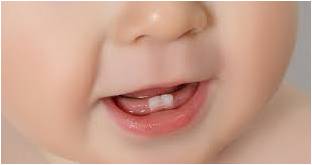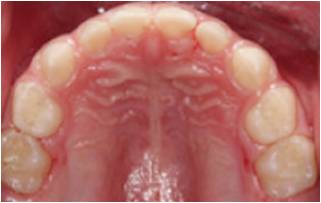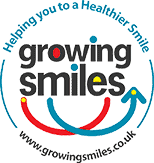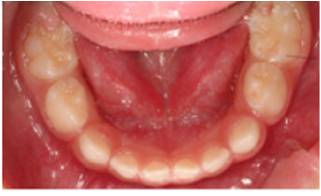Updated May 2022
So, you finally feel less zombie like, you’re starting to get baby into more of a routine, perhaps started weaning, and then BAM – here comes a tooth!
Some little ones are born with a tooth (or teeth) already in situ, but more often, teeth begin to appear around 6 months when the first lower incisor appears in the middle. Between this and around 2 ½-3 years your little one will get all 20 of their baby (primary or deciduous) teeth. As soon as a tooth erupts, it’s time to begin brushing- even if it isn’t all the way through. You may start to clean your baby’s gums before any teeth appear to ensure a healthy environment in the mouth. Brush last thing at night and one other time every day. Use a small headed toothbrush and a smear of toothpaste containing no less than 1000ppm fluoride.

The lower front teeth are the first to erupt into the mouth.

Teething is a natural process and while some children take it in their stride, others appear restless, sore and miserable. For those of us who have experienced a little one teething, we know it can appear to result in fussiness, increased crying and sleepless nights.
Below are signs that your baby may be teething:
- Chewing on fingers, hands, anything they can put in their mouth
- Increased dribbling
- One cheek is flushed
- The gum is red where the tooth is coming through
- They are more fretful than usual
There are many myths about teething and while some think teething causes other symptoms such as diarrhoea and fever, there is no evidence to support this. Teething coincides with a variety of changes in your baby’s life e.g. weaning, vaccinations etc, which can make it difficult to work out the cause of baby’s behaviour. You know your child best. If your baby is causing you concern, seek medical advice.
As you may have noticed, the market for teething products is huge! From teething rings to necklaces, from powders to gels, but which works best? The honest answer is there is no ‘magic fix’. You will work out what helps your baby (and you) through the teething period.
The following are some points to consider and recommendations when choosing teething products for your baby.
- A chewable teether is always worthwhile having on hand, even better if it can go in the fridge as the coolness will ease discomfort and distract. Always follow the manufacturer’s instructions.
- Teething products (granules, gels, powders etc). An article published in the British Dental Journal in 2019 warned parents of the potential risks of teething products. 9 of the 14 teething products licensed for use in the UK contain sucrose, alcohol and/or lidocaine, all of which have potential harmful side effects.
- CHECK INGREDIENTS of teething products. Some teething granules contain a form of SUGAR (look out for ingredients ending is -ose such as sucrose). These granules can CAUSE DECAY once teeth start to appear in the mouth.
- Teething gels containing a mild anaesthetic are only available from pharmacies. Choose one specifically designed for young children. Speak to your pharmacist for advice.
- We are fans of Gengigel teething gel – safe and effective
Another simple method is massaging the gums with a clean finger, a dry toothbrush or a Brush Baby Xylitol wipe, which you may like to keep in the fridge for extra cool relief.
Finally, we understand how upsetting it is to see your baby in pain and completely understand that you will do whatever you can to provide relief. Growing Smiles is here to help and can offer advice and guidance to get your child’s growing smile off to the best start.
Remember, teething is a pain but it is only temporary. Looking after your child’s teeth from the first sign is a lifelong investment in their smile. Don’t forget to register your child with your dentist (even if they don’t have any teeth yet!) and aim for them to have their first dental visit by their first birthday. Growing Smiles has a range of specially selected oral care products to help you look after your child’s teeth.

Read our blog posts about teething and baby teeth here.
SPECIAL OFFER: For personalised advice on caring for your baby’s teeth why not take Time Out for Teeth? Virtual coaching sessions with Leigh GS tailored to your requirements. Book now and you will receive a FREE Growing Smiles bandana dribble bib. While stocks last.
More teething tips from the NHS can be found here. The British Society of Paediatric Dentistry resources for parents can be found here.

